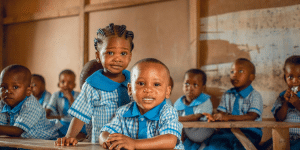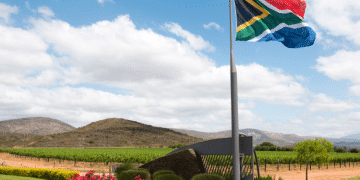From Vision to Reality: South Africa’s Groundbreaking Step Toward Universal Pre-Primary Education
A Historic Step Forward in South African Education
South Africa has taken a historic step toward fulfilling its long-held vision of universal education.
President Cyril Ramaphosa’s new law mandates one year of pre-primary education, a measure poised to transform the educational landscape of the nation significantly.
Connecting to the 1955 Anti-Apartheid Vision
This progressive law is not an isolated milestone; it resonates deeply with South Africa’s longstanding commitment to educational justice.
In 1955, anti-apartheid groups articulated a bold, inclusive vision for the nation’s future in the Freedom Charter.
Among its core tenets was the call for “free, compulsory, universal and equal education for all children.
” President Ramaphosa’s recent legislation stands as a testament to that vision, rekindling the hopes and ideals that fueled the anti-apartheid movement.

Significance for South Africa’s Democratic Journey
The enactment of this law is more than a legislative victory; it is a pivotal moment in South Africa’s democratic journey.
By making pre-primary education compulsory, the government reinforces its pivotal role in safeguarding and promoting children’s rights.
It highlights an unwavering commitment to building an educational system that is the bedrock of equality and social justice.
This milestone addresses fundamental issues that have long hindered educational access, such as prohibitive language and admission policies.
By prioritizing inclusive education that is free and accessible to all, it aims to dismantle barriers that have historically marginalized many South African youths.
Strengthening Early Childhood Foundation
The benefits of early childhood education cannot be overstated.
Quality pre-primary education is crucial for children’s cognitive and social development.
It prepares them for future academic success and promotes lifelong learning habits.
This formative stage is especially critical for children from underprivileged backgrounds, as it can help bridge the gap between varying levels of income and family resources.
Furthermore, it sets a foundation for more inclusive educational practices, particularly supporting children with disabilities.
Looking Ahead
As we move forward, the potential impacts of this legislative development will be keenly observed both domestically and globally.
Implementing this policy will undoubtedly come with its challenges, but it also offers an unparalleled opportunity to raise educational standards.
It reinforces South Africa’s steadfast dedication to achieving educational equity and sets an inspiring example for nations worldwide.
Breaking Down Educational Barriers
Tackling Language and Admission Policy Challenges
Despite significant progress, South Africa’s education system still faces barriers, particularly in language and admission policies.
These issues often prevent equitable access to quality education.
Many students in the country grow up speaking a variety of indigenous languages, but the predominance of English and Afrikaans in schools can pose a significant challenge.
Efforts are underway to promote multilingual education, ensuring that children can learn in their home languages during the critical early years.
This approach not only supports cognitive development but also helps to maintain cultural identity and inclusivity.
Making Education Free, Accessible, and Inclusive
President Cyril Ramaphosa’s new law mandating one year of pre-primary education is a crucial stride toward making education free and accessible for all children.
This law aligns with the broader goal of universal basic education, ensuring that no child is left behind due to financial limitations.
The focus is on creating an inclusive educational environment. Schools are working to provide necessary resources and support to children with disabilities.
This includes making physical infrastructure accessible, training teachers in special education needs, and fostering a culture of acceptance and inclusion.
Progress Toward Universal Basic Education
The journey toward universal basic education in South Africa has seen remarkable progress.
Around 87% of children now complete lower secondary schooling, a testament to the government’s commitment to educational equity and quality.
Implementing pre-primary education as a compulsory year sets the foundation for lifelong learning.
Early exposure to structured education helps children develop essential cognitive and social skills, improving their readiness for primary and secondary schooling.
The Transition Ahead
Addressing educational barriers is an ongoing process, requiring continuous effort and adaptation.
The new law is just the beginning.
South Africa must navigate the challenges of implementation, ensuring that every school is equipped to provide high-quality early childhood education.
As we look forward, the government’s dedication to educational equity will undoubtedly elevate both domestic and international standards.
The commitment to inclusivity and accessibility underscores South Africa’s role as a global leader in championing educational rights.
| Key Focus | Without Early Childhood Education | With Early Childhood Education |
|---|---|---|
| 🧠 Cognitive Development | Slower development of thinking and problem-solving skills | Improved critical thinking, problem-solving, and foundational academic skills |
| 🧑🤝🧑 Social Skills | Limited exposure to structured peer interaction | Better communication, cooperation, and emotional regulation |
| 💸 Socioeconomic Inequality | Widening gap in early development between income groups | More equitable educational opportunities, regardless of income |
| ♿ Inclusion of Children with Disabilities | Delayed support and fewer opportunities for integration | Early support and resources for developmental progress and inclusion |
| 🎓 Long-Term Academic Success | Greater risk of falling behind in school later on | Stronger foundation for primary school and beyond |
South Africa’s Global Leadership in Educational Rights
Ambassador Mxolisi Nkosi’s Proposal for a New International Treaty
South Africa has always been at the forefront of advocating for educational rights. Ambassador Mxolisi Nkosi reinforced this commitment by proposing a groundbreaking new treaty at the UN Human Rights Council.
The proposal aims to explicitly recognize the rights to early childhood education and free pre-primary and secondary education, a move that echoes South Africa’s longstanding dedication to inclusive and equitable education.
Push for Explicit Recognition of Early Childhood and Free Education Rights
The proposed treaty is not merely aspirational; it seeks to concretize the rights to early childhood education as fundamental human rights.
Recognizing that quality education in the formative years significantly impacts cognitive and social development, the treaty advocates for making at least one year of pre-primary education free and accessible to all children.
Ambassador Nkosi emphasized that while education is a well-recognized human right, it remains a privilege for millions of children globally, particularly those in low-income countries.
This initiative is a significant push towards ensuring that these essential educational rights are not just ideals but realities for all children, reducing disparities and promoting equity worldwide.
South Africa’s Role in Upcoming 2025 Treaty Negotiations
South Africa’s role in the upcoming 2025 treaty negotiations will be pivotal.
The nation is expected to be a leading advocate, championing robust provisions that ensure comprehensive implementation of these educational rights.
South Africa’s experience and success in expanding educational access domestically will serve as a strong foundation for its international advocacy.
The new law mandating one year of compulsory pre-primary education sets a precedent that South Africa can leverage to inspire other nations to commit to similar reforms, thereby amplifying the treaty’s impact globally.
This move aligns seamlessly with South Africa’s historical and ongoing efforts to promote educational equity, both domestically and internationally.
As the country continues to lead by example, it is poised to effect substantial changes within global educational frameworks.
South Africa’s commitment to educational rights sets the stage for further progress towards ensuring that all children receive the nurturing and educational opportunities they deserve, laying a strong foundation for a more equitable and inclusive world.
The Path Forward
Navigating Implementation Challenges
As South Africa embarks on the ambitious journey to embed one year of pre-primary education into the fabric of its educational landscape, a myriad of implementation challenges loom on the horizon.
Ensuring that this new law is not just symbolic but effectively operational demands meticulous planning and robust consultation.
Critical among these challenges are the logistical hurdles in deploying a standardized curriculum and ensuring schools are sufficiently equipped and staffed.
The infrastructure, both physical and administrative, is a colossal barrier that policymakers must overcome to provide the promised free, accessible, and inclusive education.
The consultations required to tackle these issues are no small feat.
Stakeholders from diverse backgrounds, including educators, parents, and policy-makers, need to engage in dialogue to construct a viable framework that accommodates South Africa’s multicultural tapestry.
These discussions hinge on finding a balance between uniformity and diversity in educational provision, especially concerning the integration of languages and culture-specific content.
The future success of the law deeply rests on these collaborative efforts, aimed at crafting a cohesive strategy to realize this vision.
Impact on Educational Standards
The ripple effect of implementing compulsory pre-primary education is anticipated to be substantial.
Domestically, it paves the way for elevating educational standards by embedding strong foundational skills early on.
By nurturing cognitive and social development from a young age, South Africa aspires to enhance overall student performance at subsequent educational levels.
This step could potentially catapult the nation’s educational attainment metrics, fostering a more literate and capable populace poised to drive national progress.
Internationally, South Africa’s initiative is attracting attention as a model for educational reform.
Its forward-thinking policies may inspire other nations grappling with similar challenges to adopt more holistic approaches to education.
The global education community will likely watch closely, evaluating the outcomes and considering adoption of best practices demonstrated by South Africa’s experience.
Commitment to Educational Equity
South Africa continues to champion the cause of educational equity, both within its borders and on the global stage.
The legislative push for expanded access to pre-primary education underscores a deep-seated commitment to dismantling the barriers that have historically hindered equitable educational access.
Upholding the ideals of fairness and inclusivity remains at the core of these efforts, with the ultimate goal of transcending socioeconomic and cultural divides, ensuring every child has the same opportunity to thrive.
Through this initiative, South Africa not only solidifies its stance as a beacon of educational rights but also sets the stage for further advancements.
As the nation continues to engage in meaningful dialogues and partnerships, there lies an optimistic path forward, brimming with potential for transformative change, cementing its dedication to the educational upliftment of its children.





